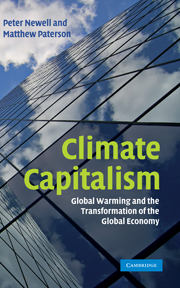Book contents
- Frontmatter
- Contents
- Preface
- Acknowledgements
- List of abbreviations
- 1 Introducing climate capitalism
- 2 Histories of climate, histories of capitalism
- 3 Climate for business: from threat to opportunity
- 4 Mobilising the power of investors
- 5 Searching for flexibility, creating a market
- 6 Caps, trades and profits
- 7 Buying our way out of trouble
- 8 The limits of climate capitalism
- 9 Governing the carbon economy
- 10 What futures for climate capitalism?
- Conclusions
- Glossary
- Index
- References
9 - Governing the carbon economy
Published online by Cambridge University Press: 05 June 2012
- Frontmatter
- Contents
- Preface
- Acknowledgements
- List of abbreviations
- 1 Introducing climate capitalism
- 2 Histories of climate, histories of capitalism
- 3 Climate for business: from threat to opportunity
- 4 Mobilising the power of investors
- 5 Searching for flexibility, creating a market
- 6 Caps, trades and profits
- 7 Buying our way out of trouble
- 8 The limits of climate capitalism
- 9 Governing the carbon economy
- 10 What futures for climate capitalism?
- Conclusions
- Glossary
- Index
- References
Summary
The criticisms of carbon markets discussed in the last chapter – whether focused on the effectiveness or inequities of such markets – raise the issue of governance. By what rules should carbon markets be governed? Who should make these rules? To whom should they be accountable?
Many economists, and those pushing for the free-market policies of the last 25 years (who we called neoliberals in Chapter 2) would respond to the question of governing markets with a quizzical look, because for them markets regulate themselves, hence the question of governance is not relevant. That's what markets do. Set up the minimal rules of play, allocate property rights and let the market do the rest. Or, in the case of climate change, hand out the emissions permits (or, better still, auction them) and sit back and let the trading begin. According to this logic, investors will seek out the best opportunities to profit from clean technology and projects that reduce overall emissions of greenhouse gases (GHGs) without the need for government steering. The rhetoric behind the trading schemes we discussed in Chapters 5 and 6, whether it is the EU's Emissions Trading Scheme (EU ETS) or the private-sector Chicago Climate Exchange, embody this logic. Many market actors like Point Carbon or the International Emissions Trading Association are currently pushing for the Clean Development Mechanism (CDM) rules to be relaxed to make it easier to get projects approved, using similar rhetoric.
- Type
- Chapter
- Information
- Climate CapitalismGlobal Warming and the Transformation of the Global Economy, pp. 141 - 160Publisher: Cambridge University PressPrint publication year: 2010



